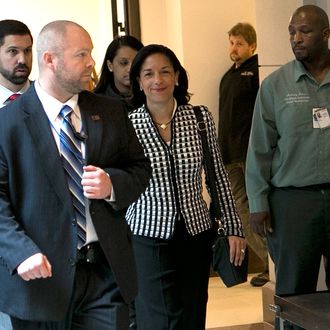
Susan Rice’s attempt to smooth things over with Congressional Republicans didn’t go over well, and now information has come to light that might tick off some on the left. The U.N. ambassador and her husband hold stock worth $300,000 to $600,000 in TransCanada, the company looking for State Department approval to build the Keystone XL pipeline. OnEarth, which is published by the Natural Resources Defense Council, reports that according to Rice’s financial disclosures, the stock earned her up to $20,000 in 2011 (federal officials are only required to give a range when disclosing their investments). Rice and her husband Ian Cameron, who’s Canadian, have investments in several Canadian energy companies, including Enbridge, TransAlta, Encana, Suncor, and Cenovus. Together those investments may make up a third of Rice’s and Cameron’s net worth, which was between $23.5 million and $43.5 million in 2009. That doesn’t disqualify Rice from becoming secretary of state, but it could make the pipeline controversy even messier when it comes up next year.
Those who oppose the project suggested that although they wouldn’t go as far as publicly vowing to do everything in their power to block Rice’s nomination, they would object to her weighing in on the pipeline. “It would be one of the first decisions she would make, and she’s not qualified to make an unbiased decision,” said Jane Kleeb, the executive director of Bold Nebraska.
Politico reports that federal officials whose stock holdings conflict with their duties are required to sell the stock, recuse themselves, or set up a qualified trust. In 2008 Rice said in a letter attached to her disclosure forms that she would “not participate personally and substantially in any particular matter that has a direct and predictable effect on my financial interests.” While President George W. Bush issued an executive order making the secretary of state responsible for approving pipelines that cross the U.S. border, Kleeb suggested that the administration could also avoid a conflict of interest if Obama shifts that duty to another agency.
Of course, another way to avoid the problem would be to nominate someone else for secretary of state, but President Obama’s public defense of Rice seems to confirm the rumors that she’s his pick for the job. When asked about Rice during a cabinet meeting today, Obama said, “Susan Rice is extraordinary. Couldn’t be prouder of the job that she’s done,” and Hillary Clinton led a round of applause for the U.N. ambassador. (Presumably Obama would have said the same thing even if Rice wasn’t in the room.) Later in the day Clinton added her own praise for Rice, wading into the dispute over her potential successor for the first time. “Susan Rice has done a great job as our ambassador to the United Nations,” said Clinton. “And, of course, this decision about my successor is up to the president, but I’m very happy he has the opportunity with a second term to make a decision.” No matter how bad the Rice controversy gets, it still won’t be as awkward as handing over the reins to Romney’s nominee.






























